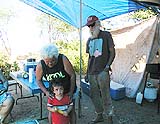By Timothy Hurley
Advertiser Maui County Bureau
KAHULUI, Maui — She’s homeless and separated from her husband, caring for her four children amid the flies and vermin of the Kanaha Beach Park campground.
 |
| Miriam and Charles Ka'auwai and their 2-year-old grandson, Ikaika, are among those who must leave Kanaha Beach Park.
Timothy Hurley • The Honolulu Advertiser |
"It’s tough,’’ the woman said, not wanting to give her name. "I want to get out of here already.’’
She has her wish. Maui County told the park’s 70 or so homeless Wednesday they must find a new place to live by Feb. 9 because of unsanitary conditions at the campground. County officials said that on the advice of the state Health Department, they’re going to bulldoze the area and clean it over a period of two months before reopening the grounds.
But there’s one problem.
"I don’t know where to go,’’ the woman said, shrugging.
More than a dozen of the homeless campers said the same thing yesterday, many of them with bitterness in their voices. Most of the them accused Mayor James "Kimo’’ Apana of pledging to help them find another place to live but failing to come through.
"Promises were made and promises were broken,’’ said Bonita Reyno, who’s been camping with her husband and four dogs a few paces from one of Maui’s premier windsurfing beaches.
But Apana yesterday said he did everything he could to get the Kanaha homeless back on their feet, including recruiting help from several social service agencies and helping them to obtain federal housing assistance.
The saga of the Kanaha homeless apparently began last summer when the county rounded up the legion of permanent campers along the shoreline between Kanaha and Kahului Harbor and told them they could stay at the park campground.
The catch was they could stay for only three days with a permit, like any other campground user.
After the group reluctantly moved in, a contingent of the campers decided to meet with Apana to seek a time extension. The mayor agreed and eventually offered fee waivers and more time extensions.
Apana told the group the county was looking to establish an "eats and sheets’’ facility providing temporary housing and meals for the homeless. He said the campers could stay at the campground while the search for a building was on, as long it was kept clean and police calls were minimized.
The group failed on both accounts, according to the mayor. Not only is there too much animal waste and rubbish at the park, he said, but the police responded to many reports of crime, including thefts, disorderly conduct and sexual assaults. The park, he said, has become unsafe for both campers and visitors to the beach.
But nearly all of the homeless yesterday disputed the mayor’s assertions.
"Unsanitary? The unsanitary is right there,’’ said former construction worker Charles Ka‘auwai, pointing to the ocean. "Smell that limu?’’
Ka‘auwai and others said the campground was a mess before they arrived. Now, the grass is regularly trimmed by the campers.
As for the crimes, several admitted that the police had been to visit on several occasions. But they said the calls weren’t for anything major.
"It’s just like any other neighborhood,’’ said a 32-year-old man who lives with his girlfriend under a multi-colored tangle of tarps. "We pretty much get along and respect each other.’’
But Moki Keanini, 26, said she’s glad she’s moving. She said she’s worried about the escalating violence.
"It’s not good for the kids to see it,’’ she said.
Originally from Moloka‘i, Keanini said her family spent two years at another encampment at Ma‘alaea in South Maui before they were forced to move by the landowner. They ended up on Maui’s north shore near Kanaha.
Being forced to move "comes with the territory’’ and she’s come to expect it. She said her family will probably just pack up their things and move to another beach.
[back to top] |

